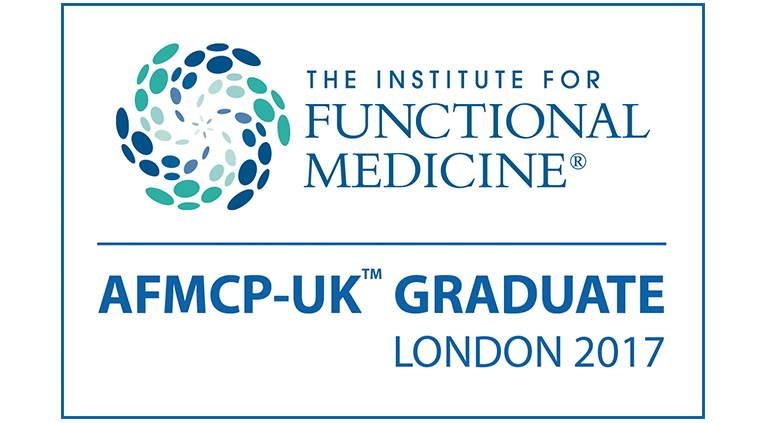Functional medicine emphasises a definable and teachable process of integrating multiple knowledge bases within a pragmatic intellectual matrix that focuses on functionality at many levels, rather than a single treatment for a single diagnosis. Functional medicine uses the patient’s story as a key tool for integrating diagnosis, signs and symptoms, and evidence of clinical imbalances into a comprehensive approach to improve both the patient’s environmental inputs and his or her physiological function. The Institute for Functional Medicine teaches health care professional’s how to apply these principles in practice through an intensive 5 day training course called Applying Functional Medicine in Clinical Practice™. I attended and completed the AFMCP™-UK training in London in 2017.
What is Functional Medicine?
Functional Medicine is an evolution in the practice of medicine that better addresses the healthcare needs of the 21st century.
By shifting the traditional disease-centered focus of medical practice to a more patient-centered approach, functional medicine addresses the whole person, not just an isolated set of symptoms. Functional Medicine practitioners spend time with their patients, listening to their histories and looking at the interactions among genetic, environmental, and lifestyle factors that can influence long-term health and complex, chronic disease. In this way, Functional Medicine supports the unique expression of health and vitality for each individual
- Our society is experiencing a sharp increase in the number of people who suffer from complex, chronic diseases, such as diabetes, heart disease, cancer, mental illness, and autoimmune disorders like rheumatoid arthritis.
- The system of medicine practiced by most physicians is oriented toward acute care, the diagnosis and treatment of trauma or illness that is
of short duration and in need of urgent care, such as appendicitis or a broken leg.
- Unfortunately, the acute-care approach to medicine lacks the proper methodology and tools for preventing and treating complex, chronic disease.
- There’s a huge gap between research and the way doctors practice. The gap between emerging research in basic sciences and integration into medical practice
is enormous—as long as 50 years—particularly in the area of complex, chronic illness.
- Most physicians are not adequately trained to assess the underlying causes of complex, chronic disease and to apply strategies such as nutrition, diet, and exercise to both treat and prevent these illnesses in their patients.
How is Functional Medicine Different
Functional Medicine involves understanding the origins, prevention, and treatment of complex, chronic disease. Hallmarks of a Functional Medicine approach include:
- Patient-centered care. The focus of functional medicine is on patient-centered care, promoting health as a positive vitality, beyond just the absence of disease.
- An integrative, science-based healthcare approach. Functional Medicine practitioners look “upstream” to consider the complex web of interactions in the patient’s history, physiology, and lifestyle that can lead to illness. The unique genetic makeup of each patient is considered, along with both internal (mind, body and spirit) and external (physical and social environment) factors that affect total functioning.
- Integrating best medical practices. Functional Medicine integrates traditional Western medical practices with what are sometimes considered “alternative” or “integrative” medicine, creating a focus on prevention through nutrition, diet, and exercise; use of the latest laboratory testing and other diagnostic techniques; and prescribed combinations of drugs and/or botanical medicines, supplements, therapeutic diets, detoxification programs, or stress-management techniques.


Comments are closed.